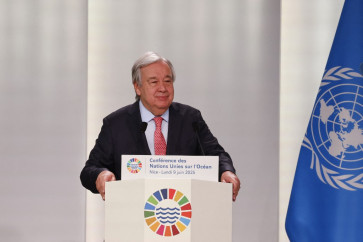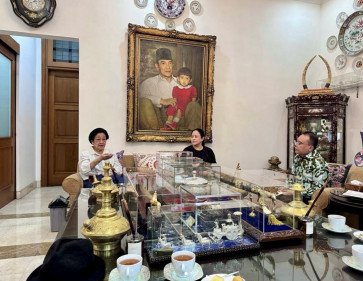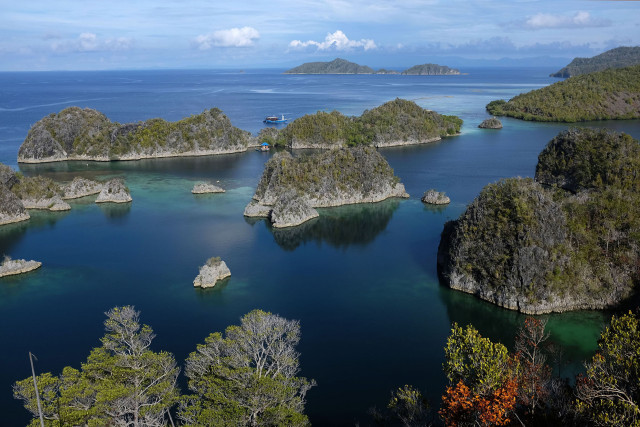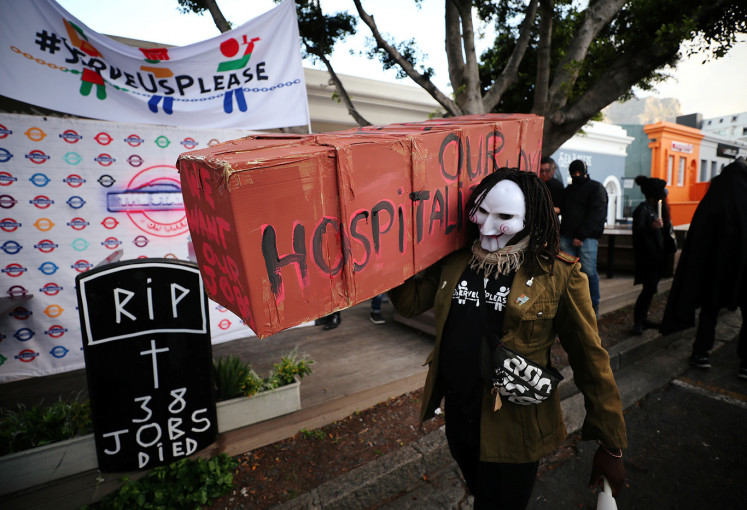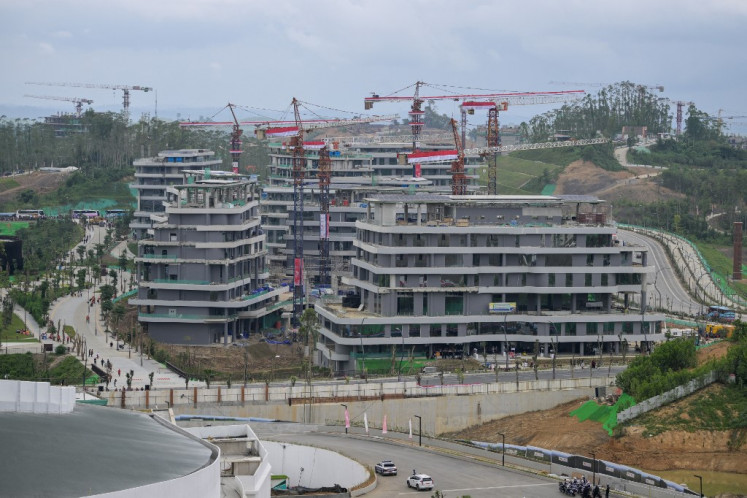Corporate Social Responsibility: Maybank empowers disabled people through sustainable entrepreneurship program
PUSH TO RISE: Maybank Indonesia president director Taswin Zakaria (left), along with (left to right) Yogyakarta Governor Sri Sultan HB X and his wife GKR Hemas, Maybank Group and Maybank Foundation Chairperson Datuk Mohaiyani Shamsudin and Maybank Foundation CEO Sharil Azuar Jimin get ready to push the siren button to mark the grand launching of the Reach Independence & Sustainable Entrepreneurship (RISE) program in Yogyakarta on Monday
Change text size
Gift Premium Articles
to Anyone

P
span class="caption">PUSH TO RISE: Maybank Indonesia president director Taswin Zakaria (left), along with (left to right) Yogyakarta Governor Sri Sultan HB X and his wife GKR Hemas, Maybank Group and Maybank Foundation Chairperson Datuk Mohaiyani Shamsudin and Maybank Foundation CEO Sharil Azuar Jimin get ready to push the siren button to mark the grand launching of the Reach Independence & Sustainable Entrepreneurship (RISE) program in Yogyakarta on Monday. The RISE program, initiated by Maybank Foundation PT Maybank Indonesia Tbk, is part of Maybank Group’s corporate social responsibility (CSR) in the field of entrepreneurship and finance for disabled people.
After conducting a pilot project and a series of implementations in a number of cities, Maybank Foundation, in cooperation with PT Bank Maybank Indonesia Tbk (Maybank Indonesia), finally launched on Monday the sustainable economic empowerment program for people with disabilities.
Called Reach Independence and Sustainable Entrepreneurship (RISE) in Indonesia, the program is part of Maybank Group’s corporate social responsibility (CSR) initiatives in the field of entrepreneurship and finance for disabled people.
Maybank Group and Maybank Foundation chairperson Datuk Mohaiyani Shamsudin led the ceremony together with Maybank Indonesia president director Taswin Zakaria, Maybank Foundation CEO Shahril Azuar Jimin, Yogyakarta Governor Sultan Hamengkubuwono X and his wife Gusti Kanjeng Ratu (GKR) Hemas.
The event was witnessed by members of Maybank Foundation’s Board of Trustees Datin Paduka Marina Mahathir, Dato’ V Danapalan and Budhi Diyah Sitawati, the Financial Services Authority’s (OJK) deputy commissioner overseeing education and consumer protection, Sarjito, the OJK’s director of Financial Education and Literacy, Horas V. M. Tarihoran, OJK Yogyakarta office head Untung Nugroho, and Bank Indonesia’s Yogyakarta representatives office head Budi Hanoto.
Maybank Indonesia president director Taswin Zakaria said economic empowerment was one of the focuses of Maybank Indonesia’s CSR programs. In line with the company’s mission to humanize financial services, he said, Maybank Indonesia had been consistently running various programs through RISE for individuals and entrepreneurs from the disabled community, with the aim to improve their unyielding spirit, confidence, skills and business capacity for a more independent and prosperous future.
“We hope this program can develop and improve the business skills of micro-sized enterprises, so that it will have a positive impact on the community and the surroundings,” Taswin said.
By improving the beneficiaries’ business skills, the participating disabled people will not just be capable of creating new job opportunities for their fellow disabled people but also employ others, including people from marginalized communities, thus creating multiplier effects on the surrounding community.
RISE is an entrepreneur mentorship and financial program specially designed for disabled people. The program comprises three weeks of training for the beneficiaries, followed by three to six months of structured mentoring.

During the training, participants are equipped with knowledge on financial management, marketing strategy and mindset change in managing a business. During the mentoring they are supervised by a personal mentor to help them improve their earning and business capacity.
The program was launched in Malaysia in September 2014. It proved a success, as it effected an average 412 percent increase in the income of its 40 best participants by April 2015. At that time, more than 1,300 participants had joined the program in Malaysia, which in 2016 was adopted at the regional level, including in Indonesia and the Philippines.
In Indonesia, the pilot project was started in 2016 involving 211 disabled people in Jakarta and Yogyakarta. It was later expanded to include 94 disabled people in Bali, 119 in Tangerang and 110 in Bogor (West Java). This year, it has been further expanded to include 55 more disabled people in Yogyakarta and 99 in Malang (East Java). A total of 2,200 beneficiaries, including those in the pilot project, are projected to be involved in the program until it is finished by 2019.
“Although the program will come to an end by 2019, we are currently preparing a continuation program to create role model entrepreneurs among the disabled community, so as to motivate others to keep struggling for their dreams,” Taswin said.

Creating change
Maybank Foundation’s RISE program has already received acknowledgment as an initiative of big potential in creating change in the life of marginalized communities. This is underlined by the fact that the program received the Silver Medal for CSR during The Global CSR Summit & Awards 2016.
Maybank Foundation CEO Shahril Azuar Jimin said no cash was given to the beneficiaries during the program. Yet, quoting a survey conducted by Nottingham University, he said that, as of July 2017, the top 40 percent of program participants have succeeded in starting or vastly improving businesses.
Shahril said experience from similar programs conducted in other countries showed that the involvement of funds at the initial stage often led to failure.
“What we do is helping the beneficiaries reach a level that will make them ready to apply for a financial facility to improve their business,” he said.
Similarly, Maybank Group chairman Datuk Mohaiyani Shamsudin said that, through the RISE program, Maybank Group supported efforts to develop independence by reaching more beneficiaries to positively impact the community.
“This program is also in line with ASEAN’s mission and the five targets of the United Nations Sustainable Development Goals,” she said.

Sarjito of the OJK welcomed the program, saying financial education and literacy in Indonesia was still relatively poor. This, he said, often led to financial disputes among consumers and producers based on a lack of mutual understanding. “I like the terms of humanizing financial services,” said Sarjito, expressing hope that such a program could be copied by other institutions.
Santoso, 28, of Yogyakarta, one of the beneficiaries of the program who suffers from a muscular disorder, said that, thanks to joining the RISE training program, he could expand his tailoring business by producing party dresses and attire. He said from the training he had learned that he needed to pick a market segment and focus on that to be successful, so he chose the middle to higher end of the market as his target market.
“Now I find it easy to earn Rp 5 million a month from previously only about Rp 1.5 million,” said Santoso, who currently employs two workers to help him with his business.
Aden Achmad, 37, of Bogor, West Java, who works as a sport wheelchair reseller, also has a success story to share. Born without legs, he has been in wheelchairs his whole life.
He said the RISE course had made him more proactive in approaching potential customers, including in the Paralympic community, government institutions and disabled athletes, as his confidence had grown through the training. Thanks to that, he improved his sales significantly, thus increasing his income from Rp 3 million a month to more than Rp 200 million.
Tanthy Trisantina, 43, of Bandung, who has a foot prosthesis, is a fashion business woman who now produces hand-painted bags. She said she had joined the RISE training course when she found that her fashion business was stagnant. With just Rp 500,000 in starting capital she began to produce bags, and some hand-painted designs now adorn her signature products.
She said the training had improved her self-confidence and her motivation to develop her business. She realized that her products had big potential for further development. So, she started approaching potential buyers and distributing samples to people of influence in their respective communities.
“I have just received an order from Kalimantan recently for 500 souvenir bags. You can calculate the value yourself, if a piece like this is priced at Rp 150,000,” said Tanthy, adding that currently she could earn up to Rp 32 million a month. 
Photos by Maybank Indonesia


